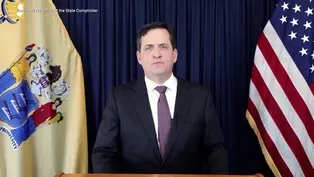NJ Spotlight News
NJ scientists researching the spread of bird flu
Clip: 2/11/2025 | 4m 50sVideo has Closed Captions
Bird flu not yet reported in New Jersey’s dairy cattle or poultry
Researchers at the Hackensack Meridian Health Center for Discovery and Innovation in Nutley have joined the fight against the bird flu, researching how the virus functions and how it reacts to certain drugs. Using a similar technology developed in 2020 to quickly detect the novel coronavirus, CDI researchers are now testing for cases of bird flu in people.
NJ Spotlight News
NJ scientists researching the spread of bird flu
Clip: 2/11/2025 | 4m 50sVideo has Closed Captions
Researchers at the Hackensack Meridian Health Center for Discovery and Innovation in Nutley have joined the fight against the bird flu, researching how the virus functions and how it reacts to certain drugs. Using a similar technology developed in 2020 to quickly detect the novel coronavirus, CDI researchers are now testing for cases of bird flu in people.
How to Watch NJ Spotlight News
NJ Spotlight News is available to stream on pbs.org and the free PBS App, available on iPhone, Apple TV, Android TV, Android smartphones, Amazon Fire TV, Amazon Fire Tablet, Roku, Samsung Smart TV, and Vizio.
Providing Support for PBS.org
Learn Moreabout PBS online sponsorshipAs public health experts raise concern over the spread of avian flu, one New Jersey health system is wasting no time taking steps to test for and track it.
So far, there are no reported cases of human infection of H5N1 in the state, but the virus has been detected in wild birds in New Jersey.
Hackensack, Meridian Health is using advanced testing at its hospitals to better understand avian flu and its emerging mutations.
Ted Goldberg got a firsthand look at how the testing works and how the research could prevent future outbreaks.
Everything we do is on behalf of the patients.
So what we want to do is to discover new treatments or new ways to improve patient's quality of life.
Researchers at the Center for Discovery and Innovation can't see the bird flu virus, but they can run tests on it and see the dead cells left in its wake.
This work is done under a ton of protection with PPE that has to be depressurized and incinerated afterwards.
We have a high containment biosafety that allow us to work with the virus without infecting others or without releasing the virus outside.
It's pumping in positive air so that if she had an exposure, she would never have a direct contact with with virus.
Dr. David Perlin is the chief scientific officer at the center in Nutley, which is looking into ways to fight the bird flu that has killed millions of egg laying chickens this year.
We infect and then we start treating with drugs to see which drugs will prevent the virus from having its inside empathic effect.
There are around 70 human cases nationwide, but none in New Jersey yet.
A lot of this equipment is is is for our molecular analysis of of pathogens, whether they were bacterial, fungal or viral.
Researchers are testing flu samples from hospital patients within the Hackensack Meridian Health System that aren't your garden variety type-A flu.
There have been three atypical flu cases, but none are bird flu so far.
So here they're taking the samples, they're processing them so that they can then isolate the nucleic acid, which we can then use for for sequencing.
Once we receive the viruses, we do sequencing, we look for mutations, especially new mutations that can cause this resistance.
If it's an H5, do we have, for example, mutations that are indicative of human transmission?
H5N1 is the technical term for bird flu.
The technology used here is similar to what was used to ID COVID early in the pandemic.
At the peak of the pandemic, we were getting hundreds, if not thousands of virus samples in a week, and we didn't have time to be able to use high throughput sequencing to be able to say it's too expensive and B, it's just too time and time consuming.
So we needed a more rapid analysis.
The rapid analysis was built from decades of research going back to previous outbreaks of diseases like anthrax and saws in the.
Early part of the pandemic.
When we saw what was happening in China, in Europe, to be able to develop our own tests and having been able to develop with other groups, FDA approved, FDA approved diagnostics, we're able to incorporate those principles rapidly.
The virus that causes bird flu isn't new, but this year's outbreak has been particularly virulent, resulting in egg prices jumping.
The H5N1 virus is very pathogenic and birds, especially chickens and ducks.
So we're seeing flocks really being decimated.
So we're losing the animals, but then also their egg laying capacity.
Dr. David Cennimo is an associate professor of medicine and pediatrics at Rutgers.
He says most people should not worry about contracting bird flu unless there's a serious mutation, which is always a risk with viruses.
These cases have, at this point been confined almost exclusively to people that had occupational contact with the virus.
So they were caring for birds and flocks that wound up infected or were dairy workers and the cows were infected.
Bird flu can also affect dairy cattle, but Dr. Cennimo says the virus is killed or deactivated by pasteurized milk and there are no reported cases of the virus in poultry or cattle statewide.
State data says more than 100 wild birds have likely died from the bird flu this season, and scientists are hard at work to limit the damage from this virus going forward.
In Nutley, I'm Ted Goldberg.
NJ Spotlight News.
9 low-income NJ school districts exceed pre-COVID test scores
Video has Closed Captions
Interview: Hannah Gross, education and child welfare writer, NJ Spotlight News (4m 23s)
Kim describes 'range of tools' against Trump's efforts
Video has Closed Captions
Interview: U.S. Sen. Andy Kim (8m 58s)
NJ comptroller orders 4 nursing homes to be sold
Video has Closed Captions
The owner pleaded guilty in Wisconsin health care fraud case (4m 10s)
Seton Hall president’s actions on McCarrick under review
Video has Closed Captions
Law firm to review whether Monsignor Joseph Reilly ‘acted appropriately’ (1m 5s)
Providing Support for PBS.org
Learn Moreabout PBS online sponsorship














